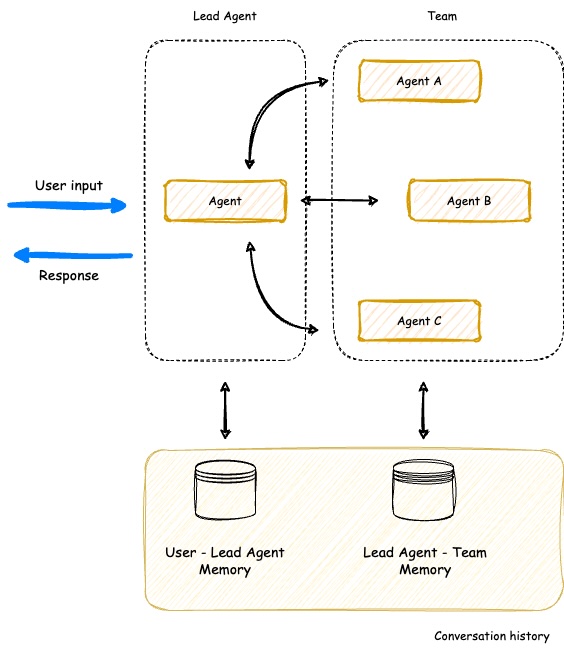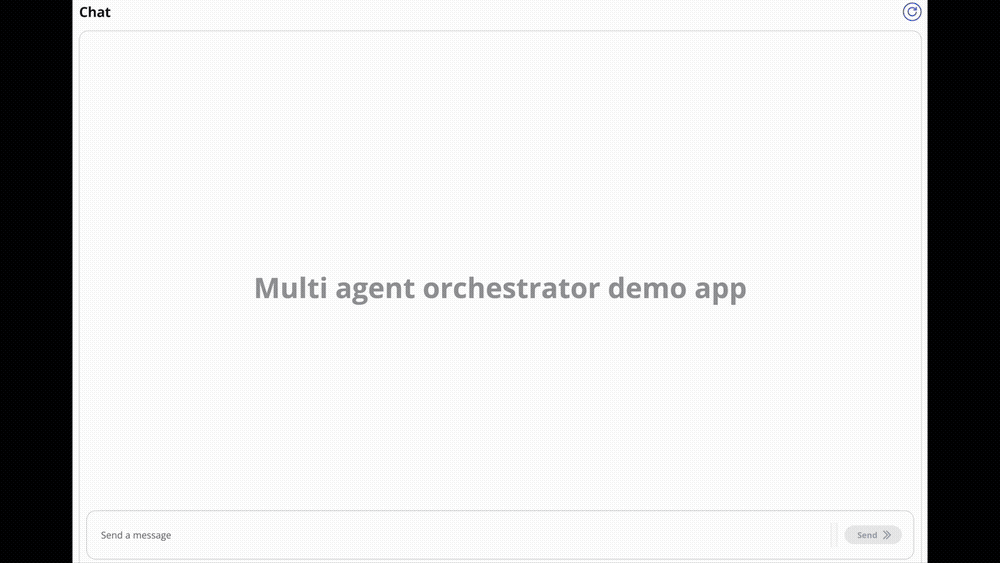
multi-agent-orchestrator
Flexible and powerful framework for managing multiple AI agents and handling complex conversations
Stars: 4568
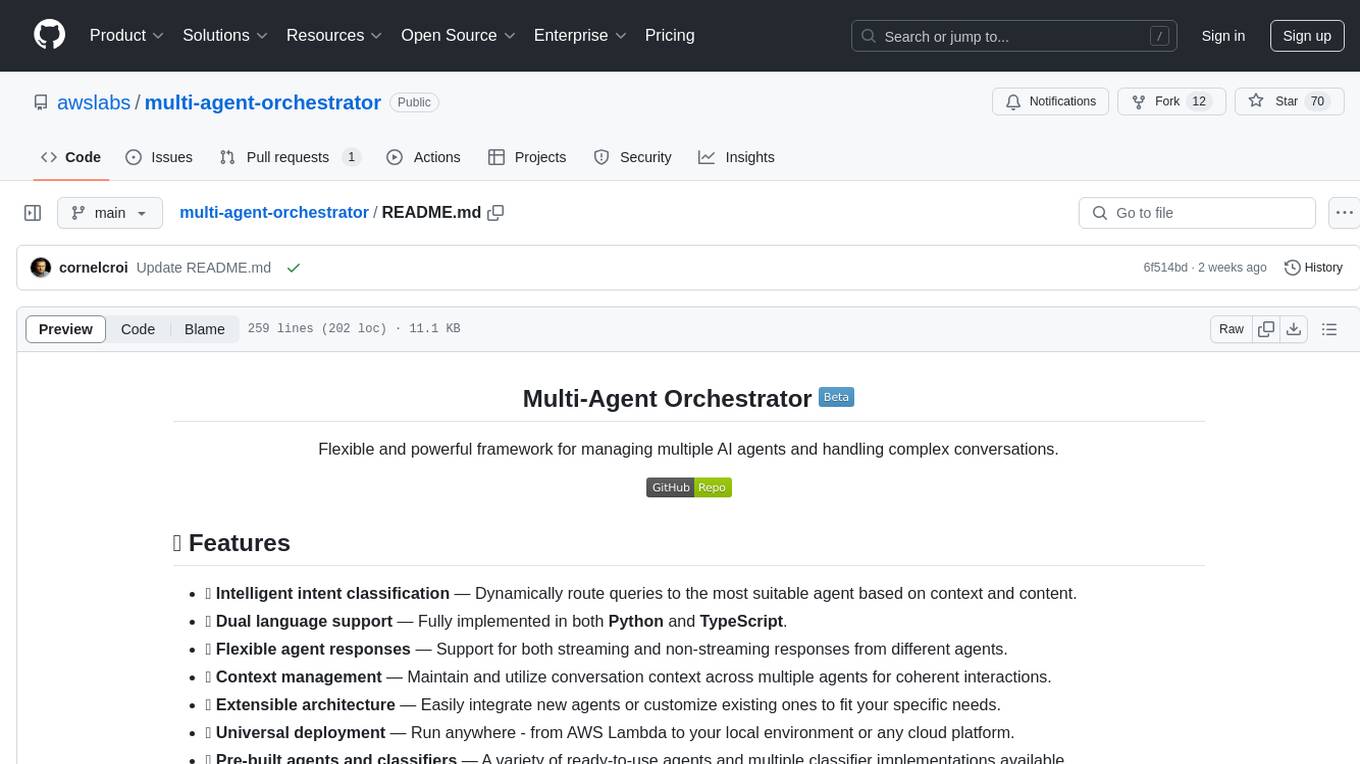
Multi-Agent Orchestrator is a flexible and powerful framework for managing multiple AI agents and handling complex conversations. It intelligently routes queries to the most suitable agent based on context and content, supports dual language implementation in Python and TypeScript, offers flexible agent responses, context management across agents, extensible architecture for customization, universal deployment options, and pre-built agents and classifiers. It is suitable for various applications, from simple chatbots to sophisticated AI systems, accommodating diverse requirements and scaling efficiently.
README:
Flexible, lightweight open-source framework for orchestrating multiple AI agents to handle complex conversations.
- 🧠 Intelligent intent classification — Dynamically route queries to the most suitable agent based on context and content.
- 🔤 Dual language support — Fully implemented in both Python and TypeScript.
- 🌊 Flexible agent responses — Support for both streaming and non-streaming responses from different agents.
- 📚 Context management — Maintain and utilize conversation context across multiple agents for coherent interactions.
- 🔧 Extensible architecture — Easily integrate new agents or customize existing ones to fit your specific needs.
- 🌐 Universal deployment — Run anywhere - from AWS Lambda to your local environment or any cloud platform.
- 📦 Pre-built agents and classifiers — A variety of ready-to-use agents and multiple classifier implementations available.
The Multi-Agent Orchestrator is a flexible framework for managing multiple AI agents and handling complex conversations. It intelligently routes queries and maintains context across interactions.
The system offers pre-built components for quick deployment, while also allowing easy integration of custom agents and conversation messages storage solutions.
This adaptability makes it suitable for a wide range of applications, from simple chatbots to sophisticated AI systems, accommodating diverse requirements and scaling efficiently.
🤖 Looking for details on Amazon Bedrock's multi-agent collaboration capability announced during Matt Garman's keynote at re:Invent 2024?
🚀 Visit the Amazon Bedrock Agents page to explore how multi-agent collaboration enables developers to build, deploy, and manage specialized agents designed for tackling complex workflows efficiently and accurately. ⚡
- The process begins with user input, which is analyzed by a Classifier.
- The Classifier leverages both Agents' Characteristics and Agents' Conversation history to select the most appropriate agent for the task.
- Once an agent is selected, it processes the user input.
- The orchestrator then saves the conversation, updating the Agents' Conversation history, before delivering the response back to the user.
The Multi-Agent Orchestrator now includes a powerful new SupervisorAgent that enables sophisticated team coordination between multiple specialized agents. This new component implements a "agent-as-tools" architecture, allowing a lead agent to coordinate a team of specialized agents in parallel, maintaining context and delivering coherent responses.
Key capabilities:
- 🤝 Team Coordination - Coordonate multiple specialized agents working together on complex tasks
- ⚡ Parallel Processing - Execute multiple agent queries simultaneously
- 🧠 Smart Context Management - Maintain conversation history across all team members
- 🔄 Dynamic Delegation - Intelligently distribute subtasks to appropriate team members
- 🤖 Agent Compatibility - Works with all agent types (Bedrock, Anthropic, Lex, etc.)
The SupervisorAgent can be used in two powerful ways:
- Direct Usage - Call it directly when you need dedicated team coordination for specific tasks
- Classifier Integration - Add it as an agent within the classifier to build complex hierarchical systems with multiple specialized teams
Here are just a few examples where this agent can be used:
- Customer Support Teams with specialized sub-teams
- AI Movie Production Studios
- Travel Planning Services
- Product Development Teams
- Healthcare Coordination Systems
Learn more about SupervisorAgent →
In the screen recording below, we demonstrate an extended version of the demo app that uses 6 specialized agents:
- Travel Agent: Powered by an Amazon Lex Bot
- Weather Agent: Utilizes a Bedrock LLM Agent with a tool to query the open-meteo API
- Restaurant Agent: Implemented as an Amazon Bedrock Agent
- Math Agent: Utilizes a Bedrock LLM Agent with two tools for executing mathematical operations
- Tech Agent: A Bedrock LLM Agent designed to answer questions on technical topics
- Health Agent: A Bedrock LLM Agent focused on addressing health-related queries
Watch as the system seamlessly switches context between diverse topics, from booking flights to checking weather, solving math problems, and providing health information. Notice how the appropriate agent is selected for each query, maintaining coherence even with brief follow-up inputs.
The demo highlights the system's ability to handle complex, multi-turn conversations while preserving context and leveraging specialized agents across various domains.
Get hands-on experience with the Multi-Agent Orchestrator through our diverse set of examples:
-
Demo Applications:
-
Streamlit Global Demo: A single Streamlit application showcasing multiple demos, including:
- AI Movie Production Studio
- AI Travel Planner
-
Chat Demo App:
- Explore multiple specialized agents handling various domains like travel, weather, math, and health
-
E-commerce Support Simulator: Experience AI-powered customer support with:
- Automated response generation for common queries
- Intelligent routing of complex issues to human support
- Real-time chat and email-style communication
- Human-in-the-loop interactions for complex cases
-
Streamlit Global Demo: A single Streamlit application showcasing multiple demos, including:
-
Sample Projects: Explore our example implementations in the
examplesfolder:-
chat-demo-app: Web-based chat interface with multiple specialized agents -
ecommerce-support-simulator: AI-powered customer support system -
chat-chainlit-app: Chat application built with Chainlit -
fast-api-streaming: FastAPI implementation with streaming support -
text-2-structured-output: Natural Language to Structured Data -
bedrock-inline-agents: Bedrock Inline Agents sample -
bedrock-prompt-routing: Bedrock Prompt Routing sample code
-
Examples are available in both Python and TypeScript. Check out our documentation for comprehensive guides on setting up and using the Multi-Agent Orchestrator framework!
Discover creative implementations and diverse applications of the Multi-Agent Orchestrator:
-
From 'Bonjour' to 'Boarding Pass': Multilingual AI Chatbot for Flight Reservations
This article demonstrates how to build a multilingual chatbot using the Multi-Agent Orchestrator framework. The article explains how to use an Amazon Lex bot as an agent, along with 2 other new agents to make it work in many languages with just a few lines of code.
-
Beyond Auto-Replies: Building an AI-Powered E-commerce Support system
This article demonstrates how to build an AI-driven multi-agent system for automated e-commerce customer email support. It covers the architecture and setup of specialized AI agents using the Multi-Agent Orchestrator framework, integrating automated processing with human-in-the-loop oversight. The guide explores email ingestion, intelligent routing, automated response generation, and human verification, providing a comprehensive approach to balancing AI efficiency with human expertise in customer support.
-
Speak Up, AI: Voicing Your Agents with Amazon Connect, Lex, and Bedrock
This article demonstrates how to build an AI customer call center. It covers the architecture and setup of specialized AI agents using the Multi-Agent Orchestrator framework interacting with voice via Amazon Connect and Amazon Lex.
-
Unlock Bedrock InvokeInlineAgent API's Hidden Potential
Learn how to scale Amazon Bedrock Agents beyond knowledge base limitations using the Multi-Agent Orchestrator framework and InvokeInlineAgent API. This article demonstrates dynamic agent creation and knowledge base selection for enterprise-scale AI applications.
-
Supercharging Amazon Bedrock Flows
Learn how to enhance Amazon Bedrock Flows with conversation memory and multi-flow orchestration using the Multi-Agent Orchestrator framework. This guide shows how to overcome Bedrock Flows' limitations to build more sophisticated AI workflows with persistent memory and intelligent routing between flows.
-
🇫🇷 Podcast (French): L'orchestrateur multi-agents : Un orchestrateur open source pour vos agents IA
- Platforms:
-
🇬🇧 Podcast (English): An Orchestrator for Your AI Agents
- Platforms:
npm install multi-agent-orchestratorThe following example demonstrates how to use the Multi-Agent Orchestrator with two different types of agents: a Bedrock LLM Agent with Converse API support and a Lex Bot Agent. This showcases the flexibility of the system in integrating various AI services.
import { MultiAgentOrchestrator, BedrockLLMAgent, LexBotAgent } from "multi-agent-orchestrator";
const orchestrator = new MultiAgentOrchestrator();
// Add a Bedrock LLM Agent with Converse API support
orchestrator.addAgent(
new BedrockLLMAgent({
name: "Tech Agent",
description:
"Specializes in technology areas including software development, hardware, AI, cybersecurity, blockchain, cloud computing, emerging tech innovations, and pricing/costs related to technology products and services.",
streaming: true
})
);
// Add a Lex Bot Agent for handling travel-related queries
orchestrator.addAgent(
new LexBotAgent({
name: "Travel Agent",
description: "Helps users book and manage their flight reservations",
botId: process.env.LEX_BOT_ID,
botAliasId: process.env.LEX_BOT_ALIAS_ID,
localeId: "en_US",
})
);
// Example usage
const response = await orchestrator.routeRequest(
"I want to book a flight",
'user123',
'session456'
);
// Handle the response (streaming or non-streaming)
if (response.streaming == true) {
console.log("\n** RESPONSE STREAMING ** \n");
// Send metadata immediately
console.log(`> Agent ID: ${response.metadata.agentId}`);
console.log(`> Agent Name: ${response.metadata.agentName}`);
console.log(`> User Input: ${response.metadata.userInput}`);
console.log(`> User ID: ${response.metadata.userId}`);
console.log(`> Session ID: ${response.metadata.sessionId}`);
console.log(
`> Additional Parameters:`,
response.metadata.additionalParams
);
console.log(`\n> Response: `);
// Stream the content
for await (const chunk of response.output) {
if (typeof chunk === "string") {
process.stdout.write(chunk);
} else {
console.error("Received unexpected chunk type:", typeof chunk);
}
}
} else {
// Handle non-streaming response (AgentProcessingResult)
console.log("\n** RESPONSE ** \n");
console.log(`> Agent ID: ${response.metadata.agentId}`);
console.log(`> Agent Name: ${response.metadata.agentName}`);
console.log(`> User Input: ${response.metadata.userInput}`);
console.log(`> User ID: ${response.metadata.userId}`);
console.log(`> Session ID: ${response.metadata.sessionId}`);
console.log(
`> Additional Parameters:`,
response.metadata.additionalParams
);
console.log(`\n> Response: ${response.output}`);
}# Optional: Set up a virtual environment
python -m venv venv
source venv/bin/activate # On Windows use `venv\Scripts\activate`
pip install multi-agent-orchestrator[aws]Here's an equivalent Python example demonstrating the use of the Multi-Agent Orchestrator with a Bedrock LLM Agent and a Lex Bot Agent:
import sys
import asyncio
from multi_agent_orchestrator.orchestrator import MultiAgentOrchestrator
from multi_agent_orchestrator.agents import BedrockLLMAgent, BedrockLLMAgentOptions, AgentStreamResponse
orchestrator = MultiAgentOrchestrator()
tech_agent = BedrockLLMAgent(BedrockLLMAgentOptions(
name="Tech Agent",
streaming=True,
description="Specializes in technology areas including software development, hardware, AI, \
cybersecurity, blockchain, cloud computing, emerging tech innovations, and pricing/costs \
related to technology products and services.",
model_id="anthropic.claude-3-sonnet-20240229-v1:0",
))
orchestrator.add_agent(tech_agent)
health_agent = BedrockLLMAgent(BedrockLLMAgentOptions(
name="Health Agent",
streaming=True,
description="Specializes in health and well being",
))
orchestrator.add_agent(health_agent)
async def main():
# Example usage
response = await orchestrator.route_request(
"What is AWS Lambda?",
'user123',
'session456',
{},
True
)
# Handle the response (streaming or non-streaming)
if response.streaming:
print("\n** RESPONSE STREAMING ** \n")
# Send metadata immediately
print(f"> Agent ID: {response.metadata.agent_id}")
print(f"> Agent Name: {response.metadata.agent_name}")
print(f"> User Input: {response.metadata.user_input}")
print(f"> User ID: {response.metadata.user_id}")
print(f"> Session ID: {response.metadata.session_id}")
print(f"> Additional Parameters: {response.metadata.additional_params}")
print("\n> Response: ")
# Stream the content
async for chunk in response.output:
async for chunk in response.output:
if isinstance(chunk, AgentStreamResponse):
print(chunk.text, end='', flush=True)
else:
print(f"Received unexpected chunk type: {type(chunk)}", file=sys.stderr)
else:
# Handle non-streaming response (AgentProcessingResult)
print("\n** RESPONSE ** \n")
print(f"> Agent ID: {response.metadata.agent_id}")
print(f"> Agent Name: {response.metadata.agent_name}")
print(f"> User Input: {response.metadata.user_input}")
print(f"> User ID: {response.metadata.user_id}")
print(f"> Session ID: {response.metadata.session_id}")
print(f"> Additional Parameters: {response.metadata.additional_params}")
print(f"\n> Response: {response.output.content}")
if __name__ == "__main__":
asyncio.run(main())These examples showcase:
- The use of a Bedrock LLM Agent with Converse API support, allowing for multi-turn conversations.
- Integration of a Lex Bot Agent for specialized tasks (in this case, travel-related queries).
- The orchestrator's ability to route requests to the most appropriate agent based on the input.
- Handling of both streaming and non-streaming responses from different types of agents.
The Multi-Agent Orchestrator is designed with a modular architecture, allowing you to install only the components you need while ensuring you always get the core functionality.
1. AWS Integration:
pip install "multi-agent-orchestrator[aws]"Includes core orchestration functionality with comprehensive AWS service integrations (BedrockLLMAgent, AmazonBedrockAgent, LambdaAgent, etc.)
2. Anthropic Integration:
pip install "multi-agent-orchestrator[anthropic]"3. OpenAI Integration:
pip install "multi-agent-orchestrator[openai]"Adds OpenAI's GPT models for agents and classification, along with core packages.
4. Full Installation:
pip install "multi-agent-orchestrator[all]"Includes all optional dependencies for maximum flexibility.
Have something to share, discuss, or brainstorm? We’d love to connect with you and hear about your journey with the Multi-Agent Orchestrator framework. Here’s how you can get involved:
-
🙌 Show & Tell: Got a success story, cool project, or creative implementation? Share it with us in the Show and Tell section. Your work might inspire the entire community! 🎉
-
💬 General Discussion: Have questions, feedback, or suggestions? Join the conversation in our General Discussions section. It’s the perfect place to connect with other users and contributors.
-
💡 Ideas: Thinking of a new feature or improvement? Share your thoughts in the Ideas section. We’re always open to exploring innovative ways to make the orchestrator even better!
Let’s collaborate, learn from each other, and build something incredible together! 🚀
This repository follows an Issue-First policy:
- Every pull request must be linked to an existing issue
- If there isn't an issue for the changes you want to make, please create one first
- Use the issue to discuss proposed changes before investing time in implementation
When creating a pull request, you must link it to an issue using one of these methods:
-
Include a reference in the PR description using keywords:
Fixes #123Resolves #123Closes #123
-
Manually link the PR to an issue through GitHub's UI:
- On the right sidebar of your PR, click "Development" and then "Link an issue"
We use GitHub Actions to automatically verify that each PR is linked to an issue. PRs without linked issues will not pass required checks and cannot be merged.
This policy helps us:
- Maintain clear documentation of changes and their purposes
- Ensure community discussion before implementation
- Keep a structured development process
- Make project history more traceable and understandable
Once your proposal is approved, here are the next steps:
- 📚 Review our Contributing Guide
- 💡 Create a GitHub Issue
- 🔨 Submit a pull request
✅ Follow existing project structure and include documentation for new features.
🌟 Stay Updated: Star the repository to be notified about new features, improvements, and exciting developments in the Multi-Agent Orchestrator framework!
Big shout out to our awesome contributors! Thank you for making this project better! 🌟 ⭐ 🚀
Please see our contributing guide for guidelines on how to propose bugfixes and improvements.
This project is licensed under the Apache 2.0 licence - see the LICENSE file for details.
This project uses the JetBrainsMono NF font, licensed under the SIL Open Font License 1.1. For full license details, see FONT-LICENSE.md.
For Tasks:
Click tags to check more tools for each tasksFor Jobs:
Alternative AI tools for multi-agent-orchestrator
Similar Open Source Tools

multi-agent-orchestrator
Multi-Agent Orchestrator is a flexible and powerful framework for managing multiple AI agents and handling complex conversations. It intelligently routes queries to the most suitable agent based on context and content, supports dual language implementation in Python and TypeScript, offers flexible agent responses, context management across agents, extensible architecture for customization, universal deployment options, and pre-built agents and classifiers. It is suitable for various applications, from simple chatbots to sophisticated AI systems, accommodating diverse requirements and scaling efficiently.
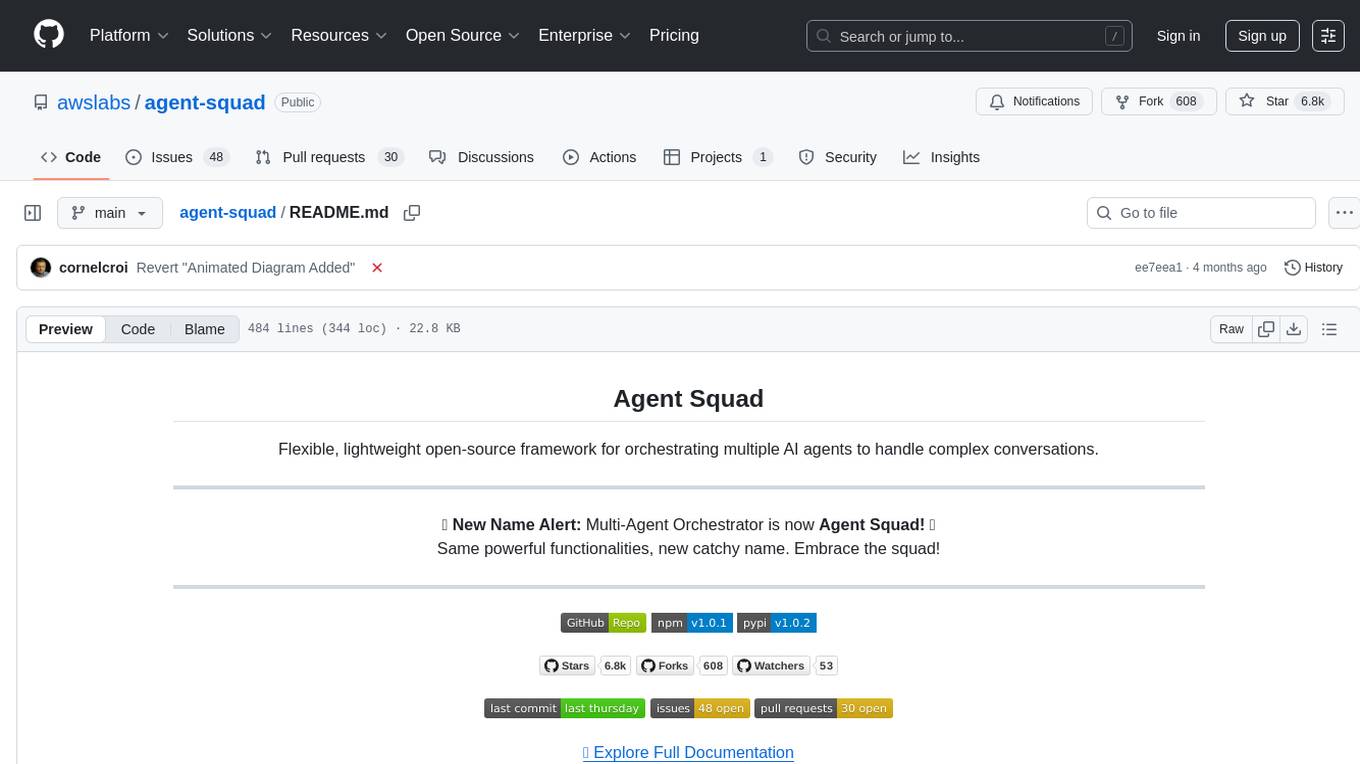
agent-squad
Agent Squad is a flexible, lightweight open-source framework for orchestrating multiple AI agents to handle complex conversations. It intelligently routes queries, maintains context across interactions, and offers pre-built components for quick deployment. The system allows easy integration of custom agents and conversation messages storage solutions, making it suitable for various applications from simple chatbots to sophisticated AI systems, scaling efficiently.
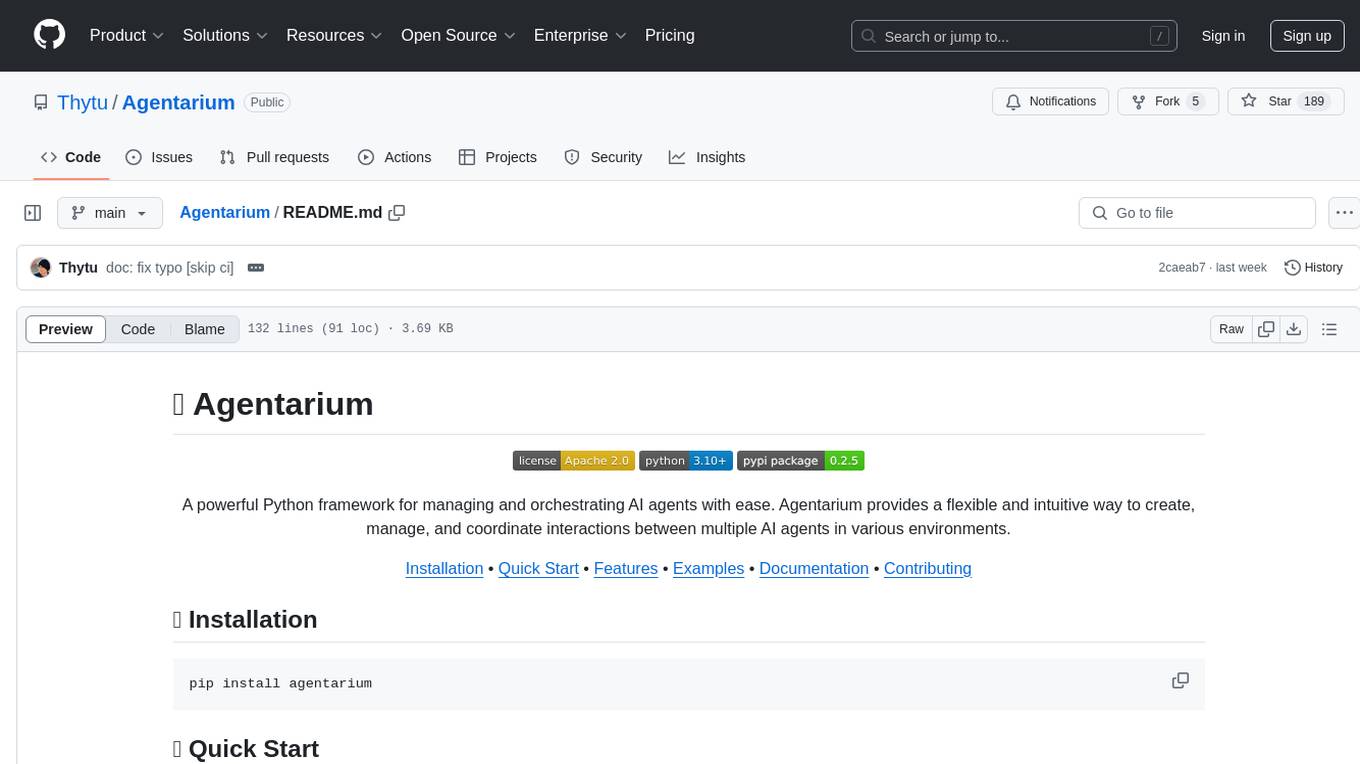
Agentarium
Agentarium is a powerful Python framework for managing and orchestrating AI agents with ease. It provides a flexible and intuitive way to create, manage, and coordinate interactions between multiple AI agents in various environments. The framework offers advanced agent management, robust interaction management, a checkpoint system for saving and restoring agent states, data generation through agent interactions, performance optimization, flexible environment configuration, and an extensible architecture for customization.
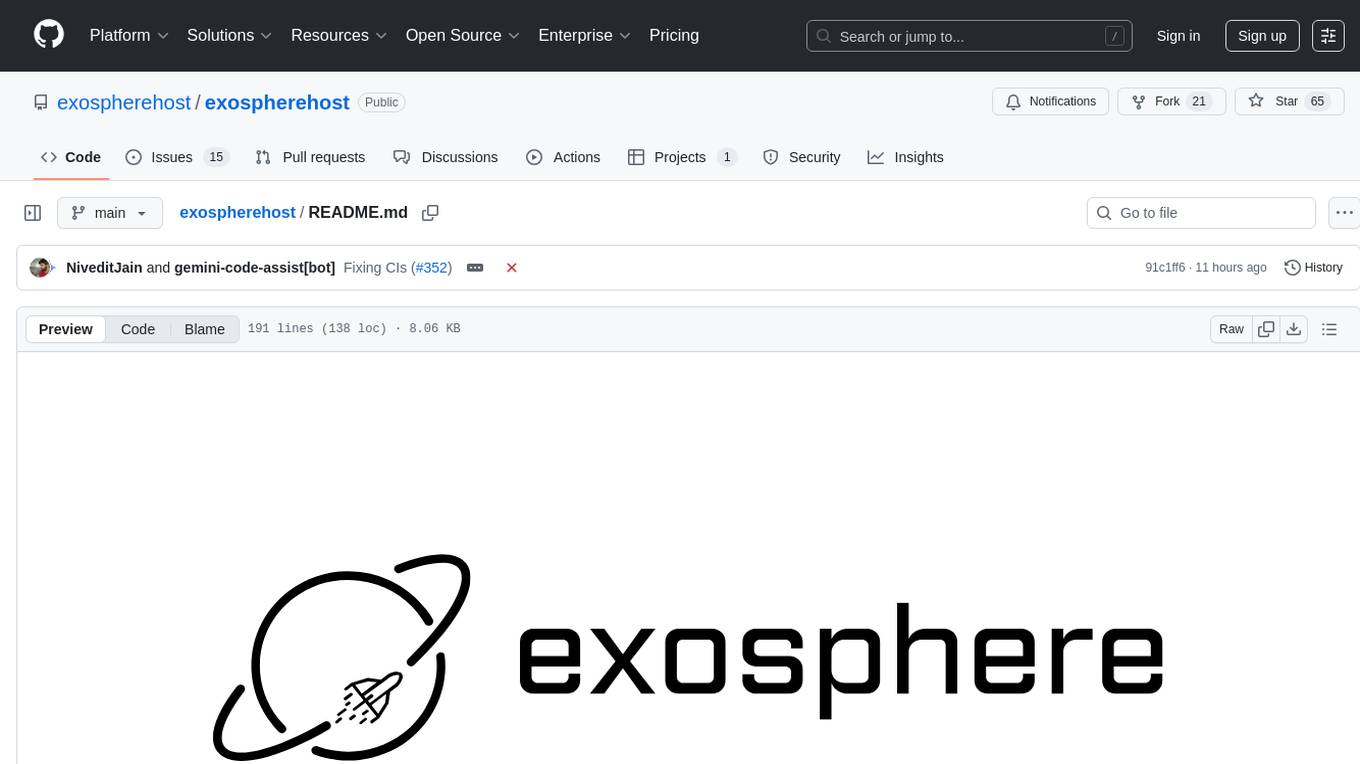
exospherehost
Exosphere is an open source infrastructure designed to run AI agents at scale for large data and long running flows. It allows developers to define plug and playable nodes that can be run on a reliable backbone in the form of a workflow, with features like dynamic state creation at runtime, infinite parallel agents, persistent state management, and failure handling. This enables the deployment of production agents that can scale beautifully to build robust autonomous AI workflows.
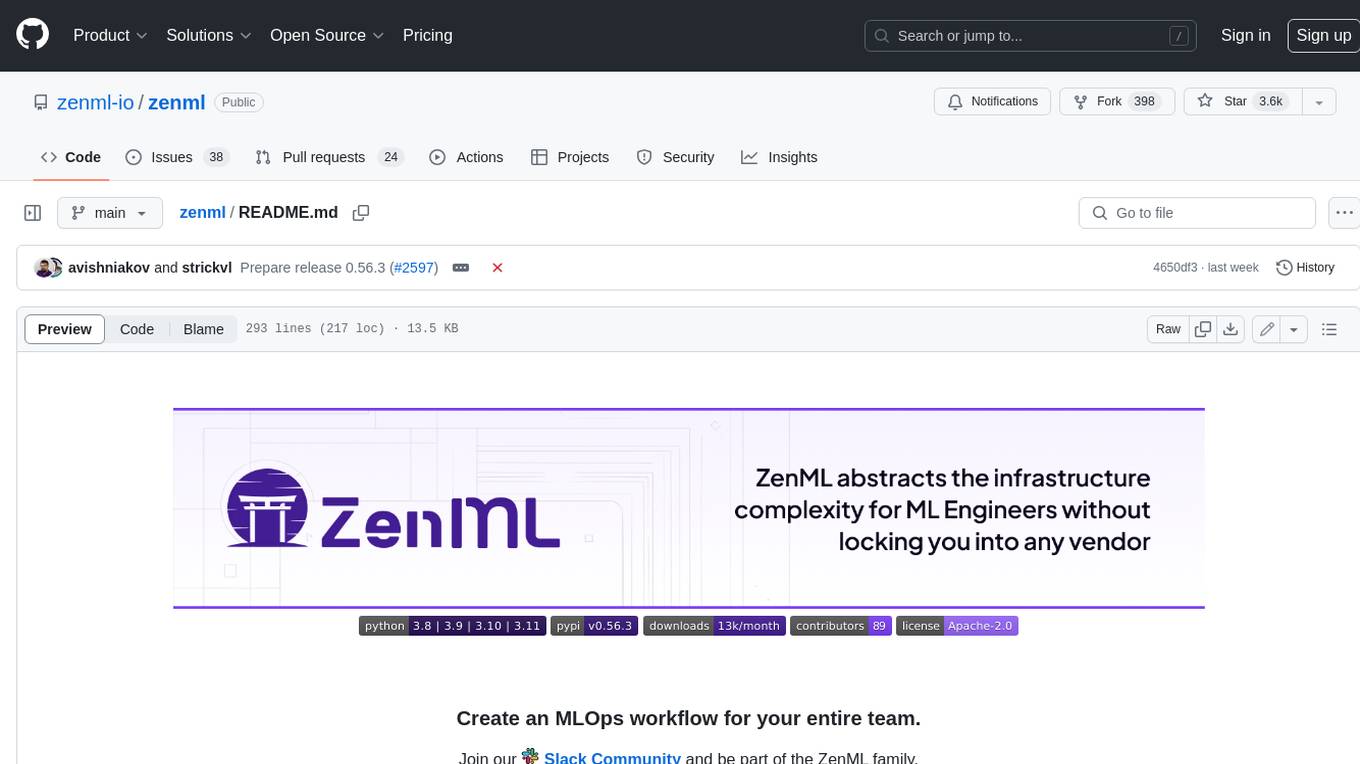
zenml
ZenML is an extensible, open-source MLOps framework for creating portable, production-ready machine learning pipelines. By decoupling infrastructure from code, ZenML enables developers across your organization to collaborate more effectively as they develop to production.
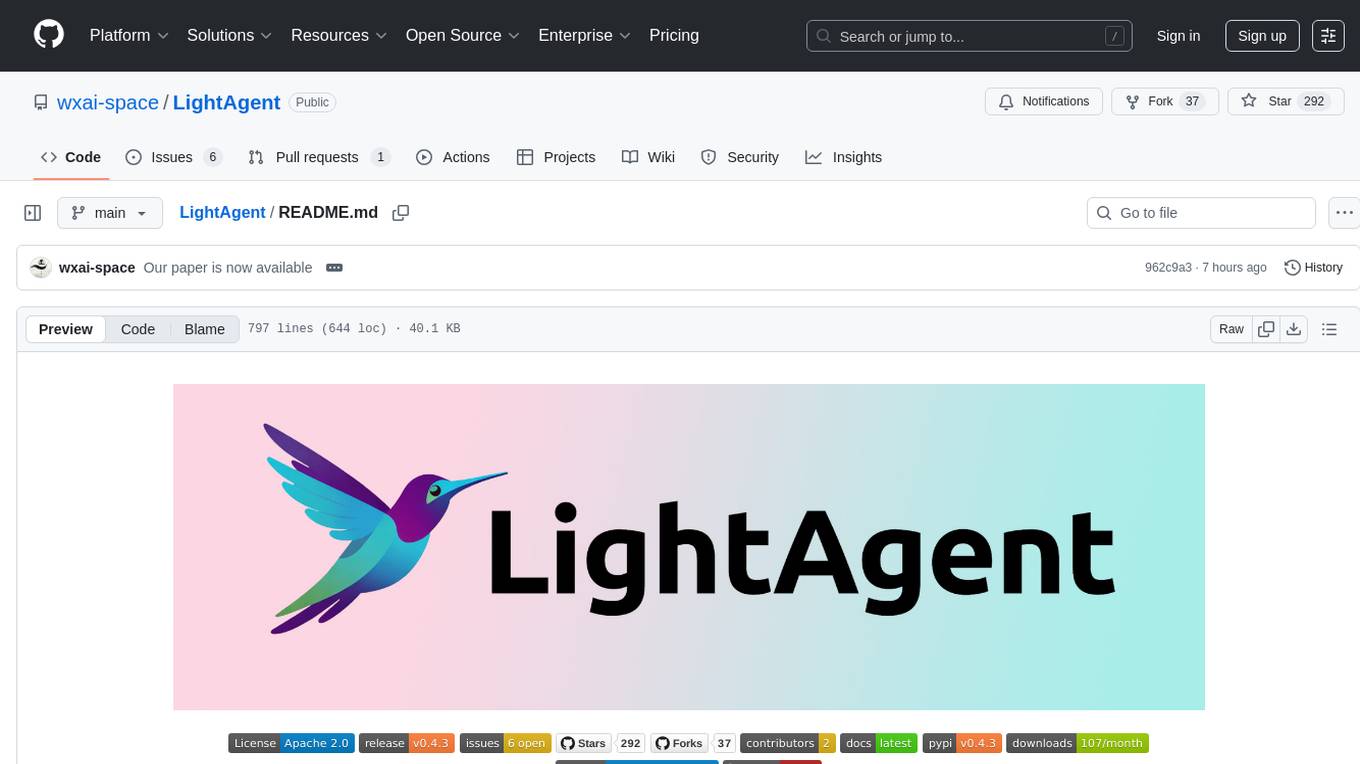
LightAgent
LightAgent is a lightweight, open-source Agentic AI development framework with memory, tools, and a tree of thought. It supports multi-agent collaboration, autonomous learning, tool integration, complex task handling, and multi-model support. It also features a streaming API, tool generator, agent self-learning, adaptive tool mechanism, and more. LightAgent is designed for intelligent customer service, data analysis, automated tools, and educational assistance.
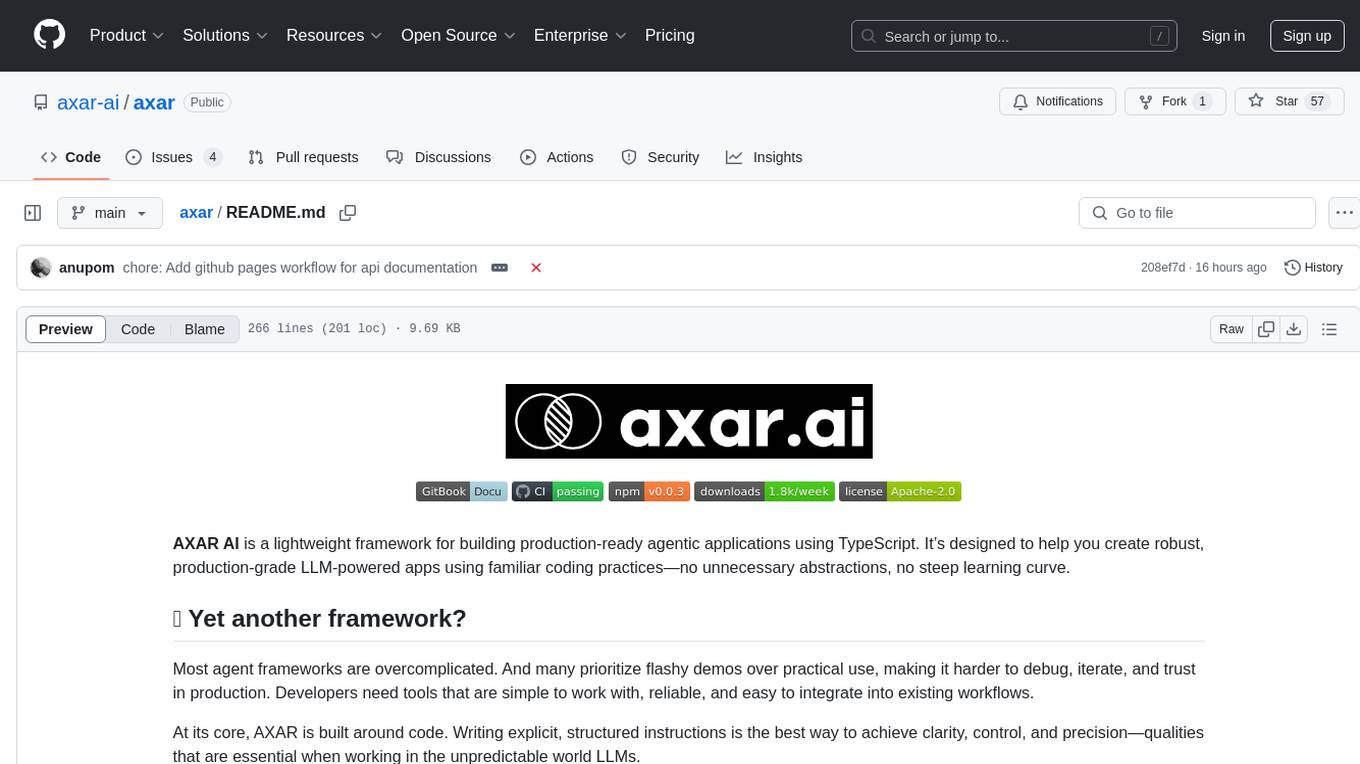
axar
AXAR AI is a lightweight framework designed for building production-ready agentic applications using TypeScript. It aims to simplify the process of creating robust, production-grade LLM-powered apps by focusing on familiar coding practices without unnecessary abstractions or steep learning curves. The framework provides structured, typed inputs and outputs, familiar and intuitive patterns like dependency injection and decorators, explicit control over agent behavior, real-time logging and monitoring tools, minimalistic design with little overhead, model agnostic compatibility with various AI models, and streamed outputs for fast and accurate results. AXAR AI is ideal for developers working on real-world AI applications who want a tool that gets out of the way and allows them to focus on shipping reliable software.
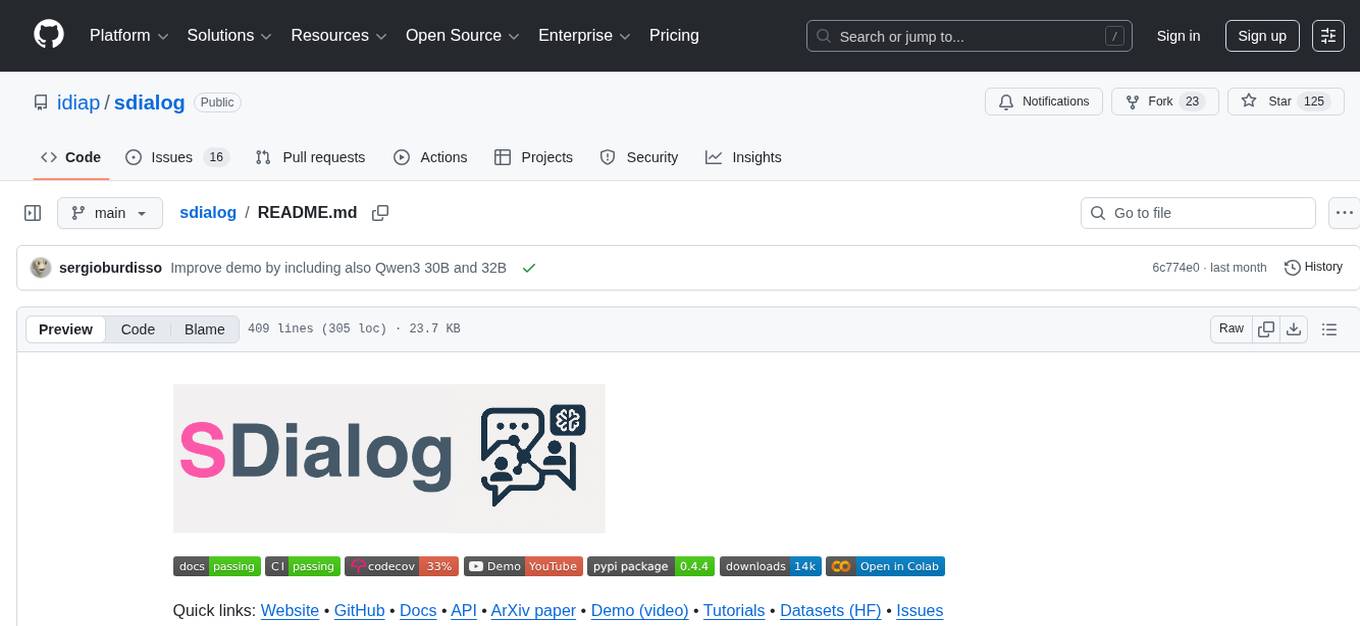
sdialog
SDialog is an MIT-licensed open-source toolkit for building, simulating, and evaluating LLM-based conversational agents end-to-end. It aims to bridge agent construction, user simulation, dialog generation, and evaluation in a single reproducible workflow, enabling the generation of reliable, controllable dialog systems or data at scale. The toolkit standardizes a Dialog schema, offers persona-driven multi-agent simulation with LLMs, provides composable orchestration for precise control over behavior and flow, includes built-in evaluation metrics, and offers mechanistic interpretability. It allows for easy creation of user-defined components and interoperability across various AI platforms.
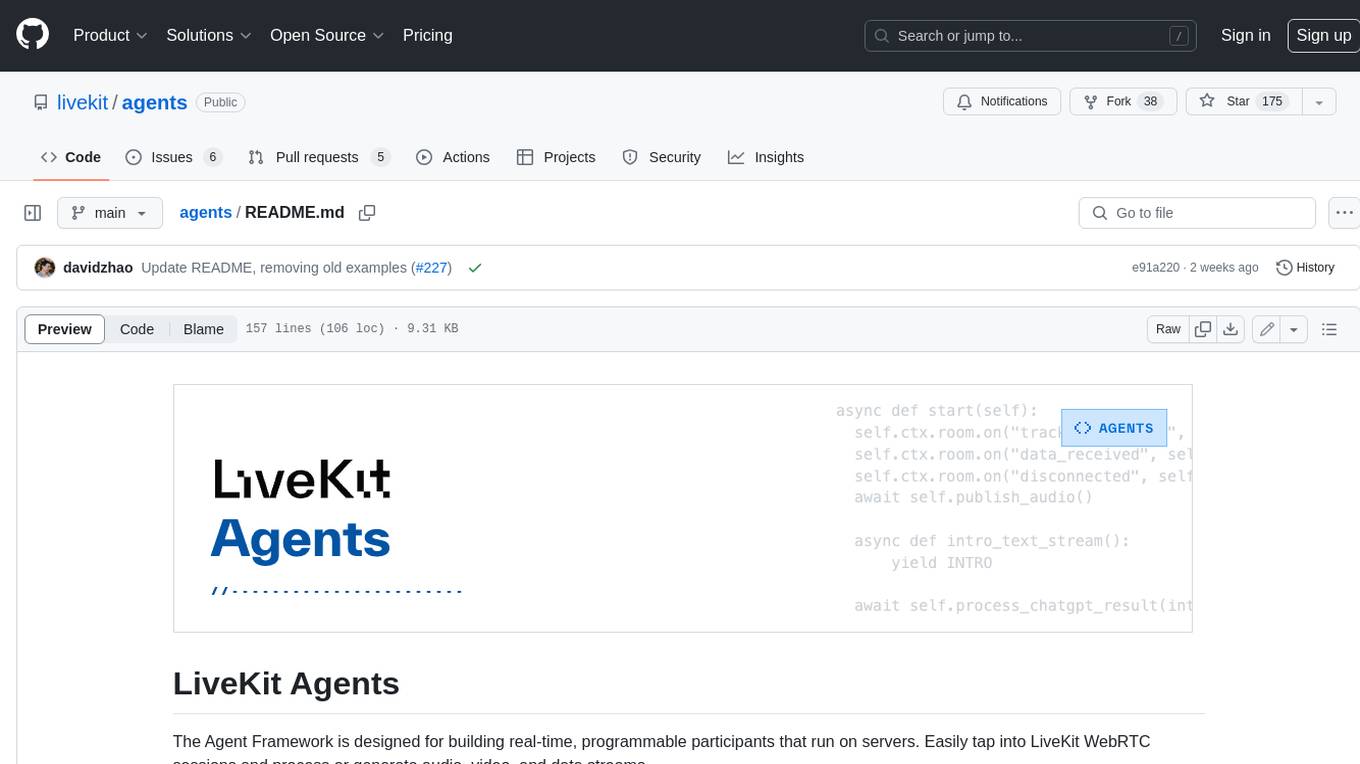
agents
The LiveKit Agent Framework is designed for building real-time, programmable participants that run on servers. Easily tap into LiveKit WebRTC sessions and process or generate audio, video, and data streams. The framework includes plugins for common workflows, such as voice activity detection and speech-to-text. Agents integrates seamlessly with LiveKit server, offloading job queuing and scheduling responsibilities to it. This eliminates the need for additional queuing infrastructure. Agent code developed on your local machine can scale to support thousands of concurrent sessions when deployed to a server in production.

Biomni
Biomni is a general-purpose biomedical AI agent designed to autonomously execute a wide range of research tasks across diverse biomedical subfields. By integrating cutting-edge large language model (LLM) reasoning with retrieval-augmented planning and code-based execution, Biomni helps scientists dramatically enhance research productivity and generate testable hypotheses.

maiar-ai
MAIAR is a composable, plugin-based AI agent framework designed to abstract data ingestion, decision-making, and action execution into modular plugins. It enables developers to define triggers and actions as standalone plugins, while the core runtime handles decision-making dynamically. This framework offers extensibility, composability, and model-driven behavior, allowing seamless addition of new functionality. MAIAR's architecture is influenced by Unix pipes, ensuring highly composable plugins, dynamic execution pipelines, and transparent debugging. It remains declarative and extensible, allowing developers to build complex AI workflows without rigid architectures.

semantic-kernel
Semantic Kernel is an SDK that integrates Large Language Models (LLMs) like OpenAI, Azure OpenAI, and Hugging Face with conventional programming languages like C#, Python, and Java. Semantic Kernel achieves this by allowing you to define plugins that can be chained together in just a few lines of code. What makes Semantic Kernel _special_ , however, is its ability to _automatically_ orchestrate plugins with AI. With Semantic Kernel planners, you can ask an LLM to generate a plan that achieves a user's unique goal. Afterwards, Semantic Kernel will execute the plan for the user.
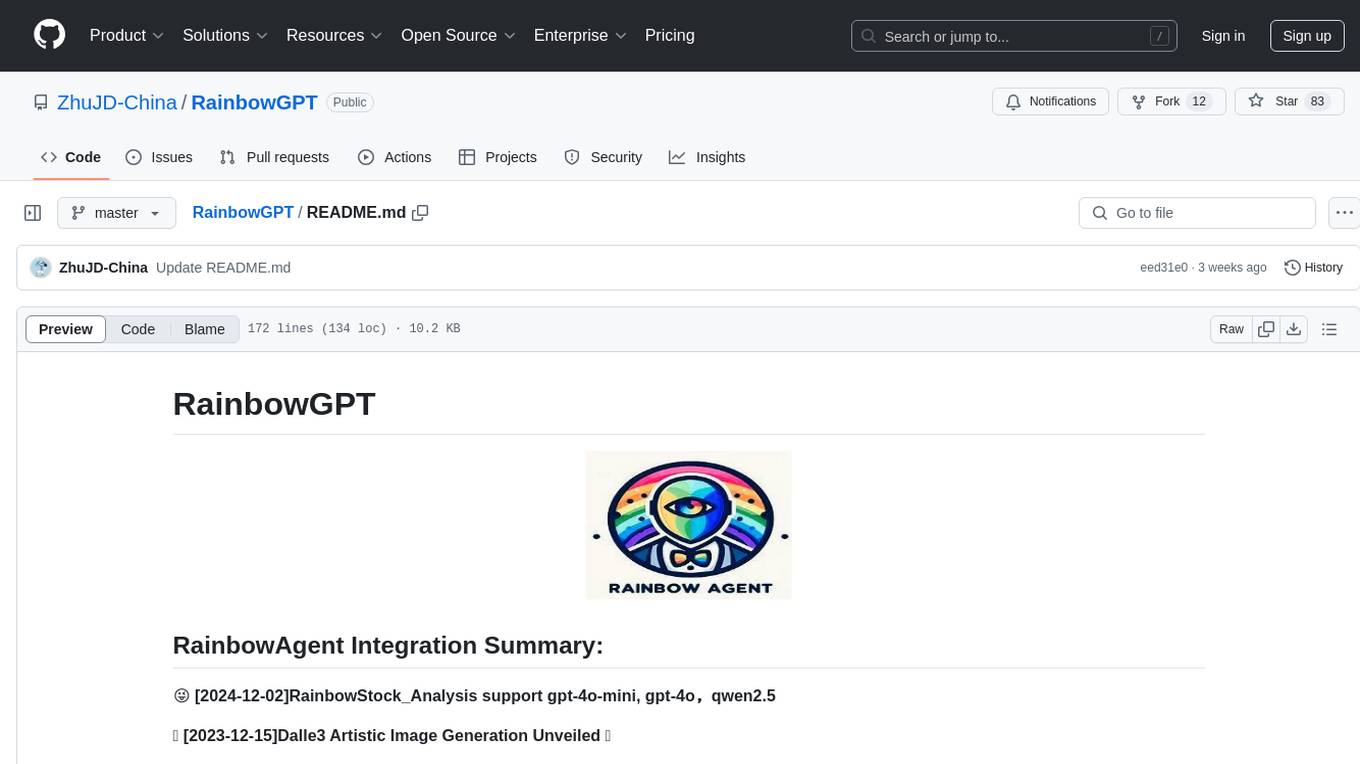
RainbowGPT
RainbowGPT is a versatile tool that offers a range of functionalities, including Stock Analysis for financial decision-making, MySQL Management for database navigation, and integration of AI technologies like GPT-4 and ChatGlm3. It provides a user-friendly interface suitable for all skill levels, ensuring seamless information flow and continuous expansion of emerging technologies. The tool enhances adaptability, creativity, and insight, making it a valuable asset for various projects and tasks.
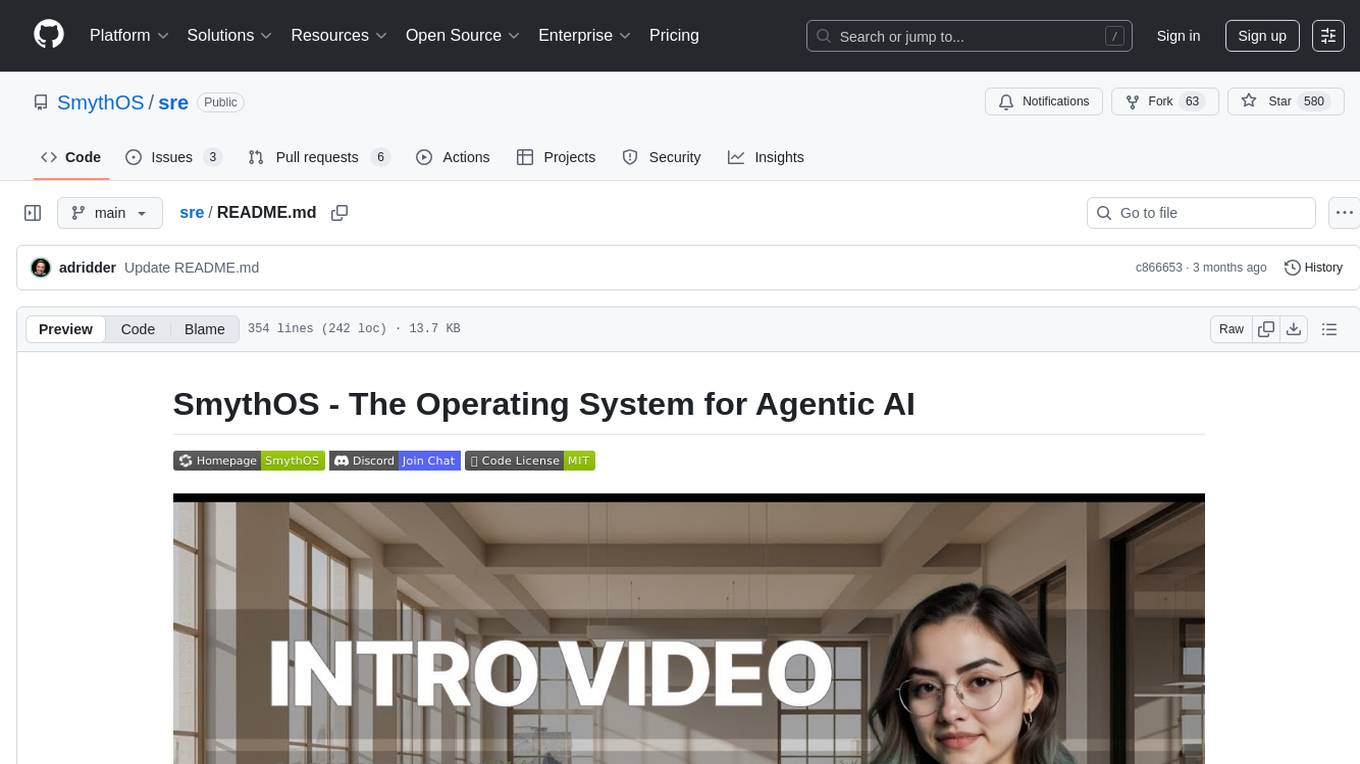
sre
SmythOS is an operating system designed for building, deploying, and managing intelligent AI agents at scale. It provides a unified SDK and resource abstraction layer for various AI services, making it easy to scale and flexible. With an agent-first design, developer-friendly SDK, modular architecture, and enterprise security features, SmythOS offers a robust foundation for AI workloads. The system is built with a philosophy inspired by traditional operating system kernels, ensuring autonomy, control, and security for AI agents. SmythOS aims to make shipping production-ready AI agents accessible and open for everyone in the coming Internet of Agents era.
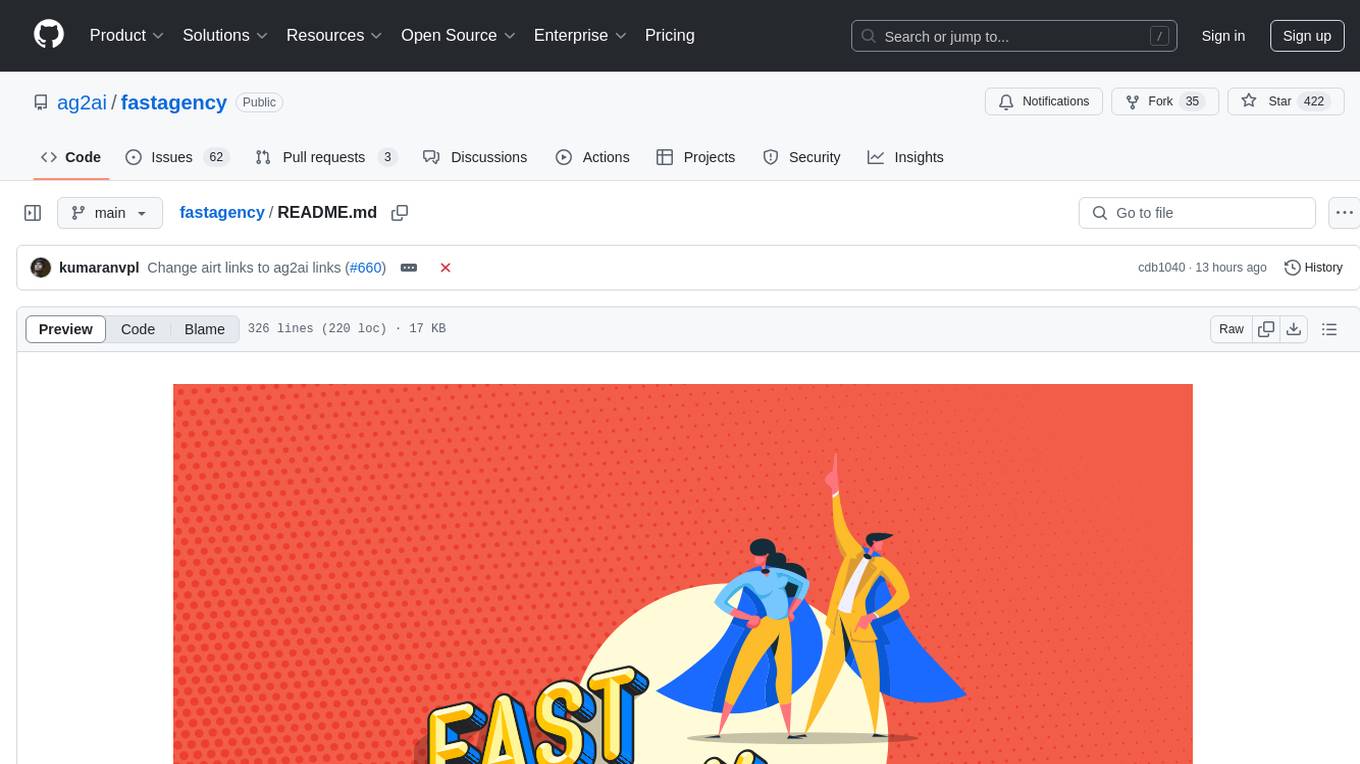
fastagency
FastAgency is an open-source framework designed to accelerate the transition from prototype to production for multi-agent AI workflows. It provides a unified programming interface for deploying agentic workflows written in AG2 agentic framework in both development and productional settings. With features like seamless external API integration, a Tester Class for continuous integration, and a Command-Line Interface (CLI) for orchestration, FastAgency streamlines the deployment process, saving time and effort while maintaining flexibility and performance. Whether orchestrating complex AI agents or integrating external APIs, FastAgency helps users quickly transition from concept to production, reducing development cycles and optimizing multi-agent systems.
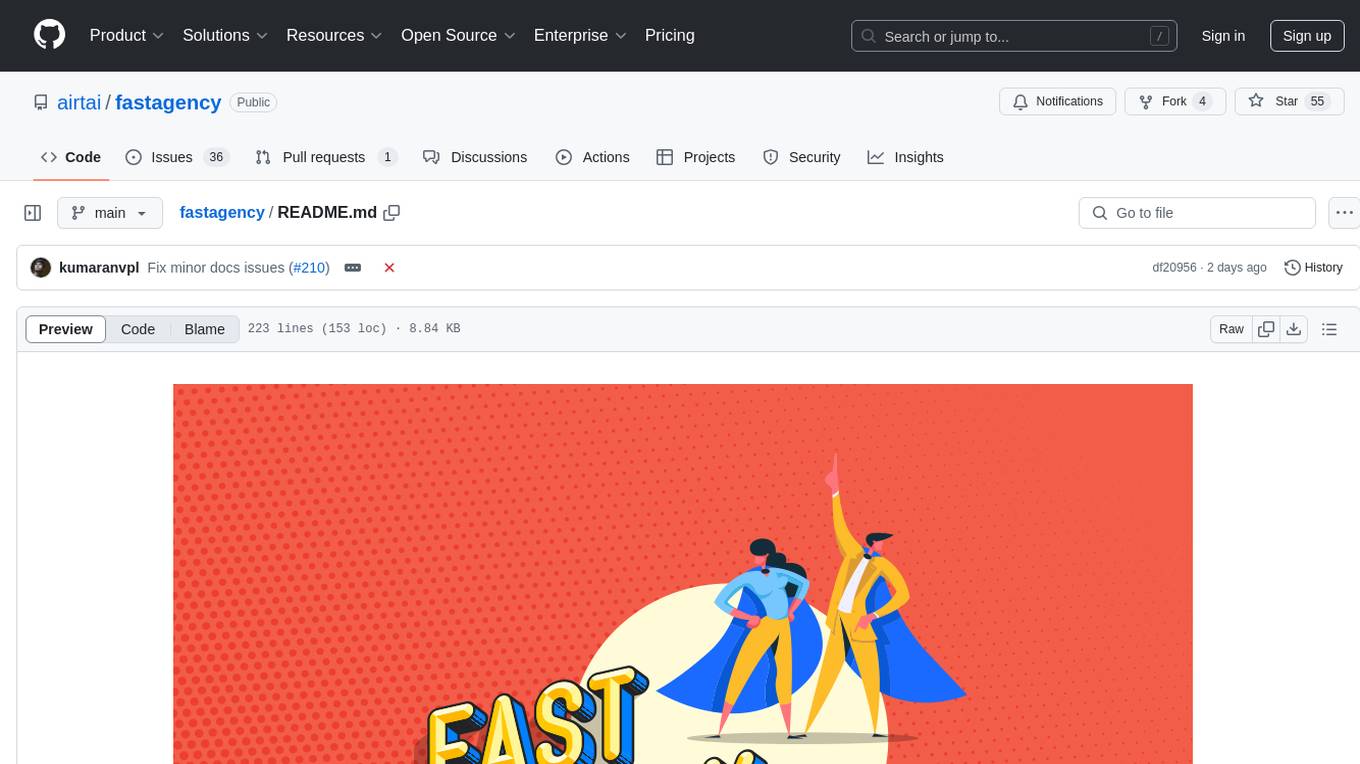
fastagency
FastAgency is a powerful tool that leverages the AutoGen framework to quickly build applications with multi-agent workflows. It supports various interfaces like ConsoleUI and MesopUI, allowing users to create interactive applications. The tool enables defining workflows between agents, such as students and teachers, and summarizing conversations. FastAgency aims to expand its capabilities by integrating with additional agentic frameworks like CrewAI, providing more options for workflow definition and AI tool integration.
For similar tasks

multi-agent-orchestrator
Multi-Agent Orchestrator is a flexible and powerful framework for managing multiple AI agents and handling complex conversations. It intelligently routes queries to the most suitable agent based on context and content, supports dual language implementation in Python and TypeScript, offers flexible agent responses, context management across agents, extensible architecture for customization, universal deployment options, and pre-built agents and classifiers. It is suitable for various applications, from simple chatbots to sophisticated AI systems, accommodating diverse requirements and scaling efficiently.
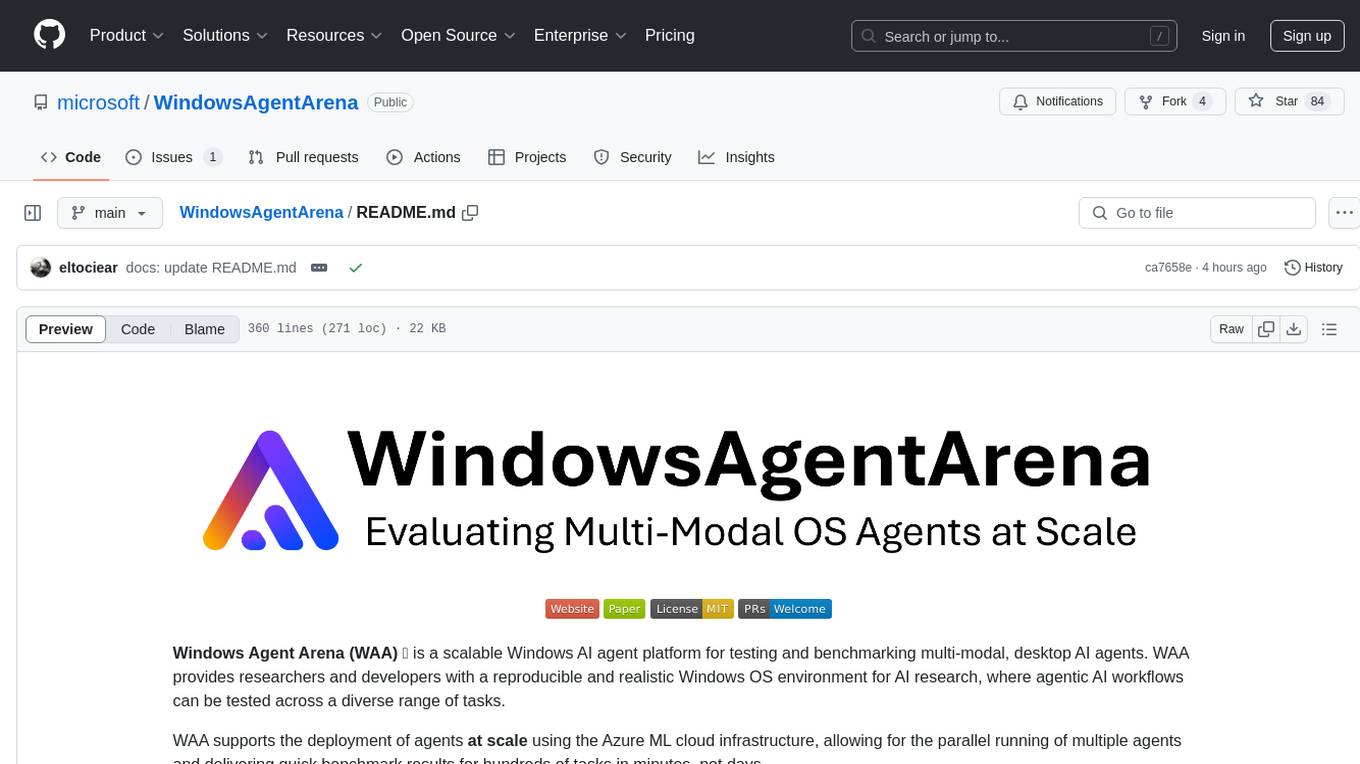
WindowsAgentArena
Windows Agent Arena (WAA) is a scalable Windows AI agent platform designed for testing and benchmarking multi-modal, desktop AI agents. It provides researchers and developers with a reproducible and realistic Windows OS environment for AI research, enabling testing of agentic AI workflows across various tasks. WAA supports deploying agents at scale using Azure ML cloud infrastructure, allowing parallel running of multiple agents and delivering quick benchmark results for hundreds of tasks in minutes.
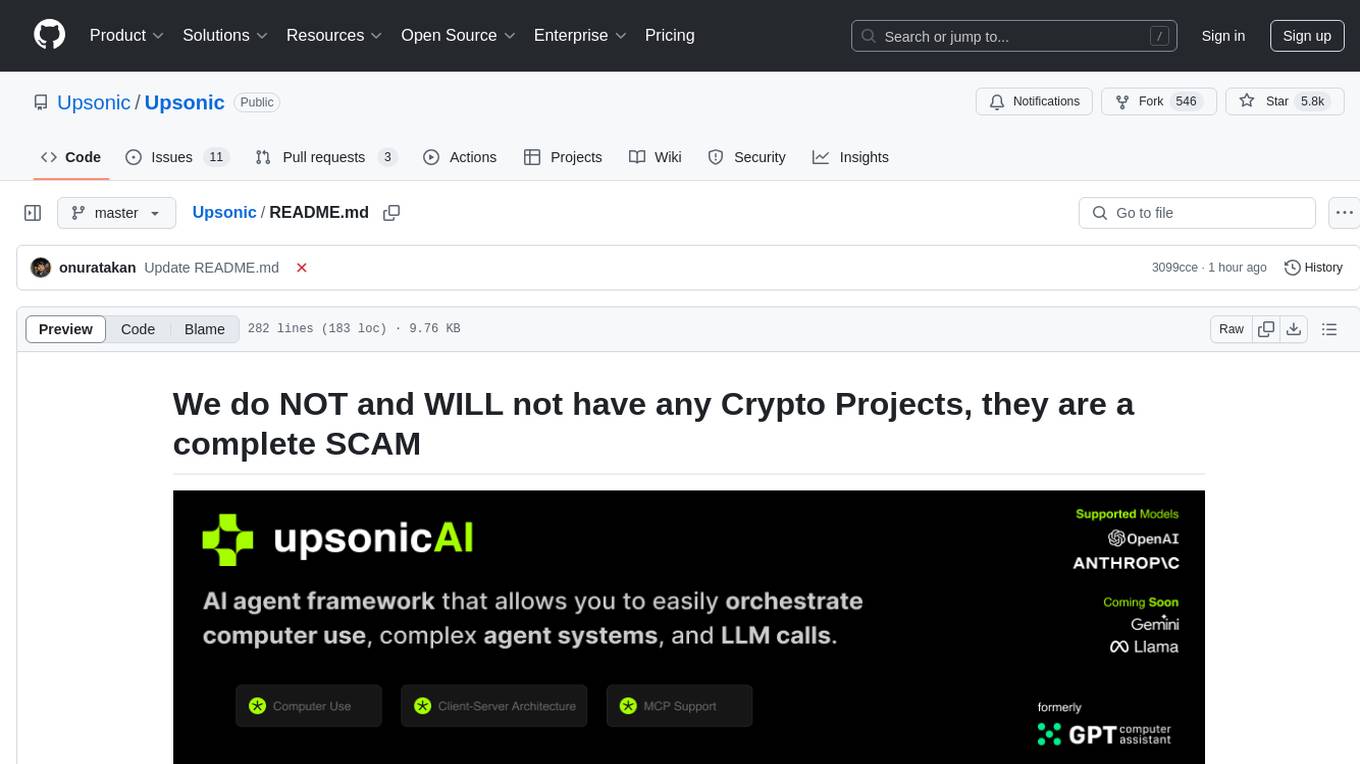
Upsonic
Upsonic offers a cutting-edge enterprise-ready framework for orchestrating LLM calls, agents, and computer use to complete tasks cost-effectively. It provides reliable systems, scalability, and a task-oriented structure for real-world cases. Key features include production-ready scalability, task-centric design, MCP server support, tool-calling server, computer use integration, and easy addition of custom tools. The framework supports client-server architecture and allows seamless deployment on AWS, GCP, or locally using Docker.
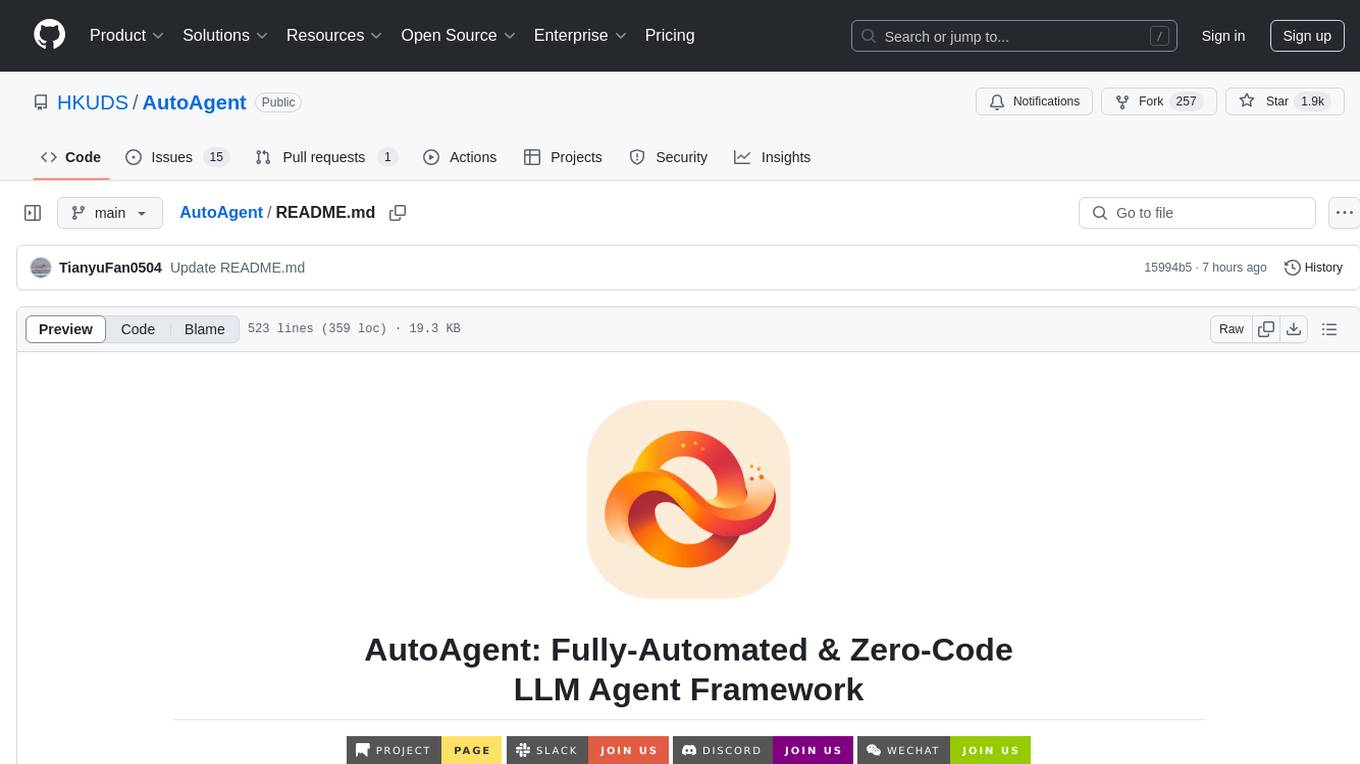
AutoAgent
AutoAgent is a fully-automated and zero-code framework that enables users to create and deploy LLM agents through natural language alone. It is a top performer on the GAIA Benchmark, equipped with a native self-managing vector database, and allows for easy creation of tools, agents, and workflows without any coding. AutoAgent seamlessly integrates with a wide range of LLMs and supports both function-calling and ReAct interaction modes. It is designed to be dynamic, extensible, customized, and lightweight, serving as a personal AI assistant.
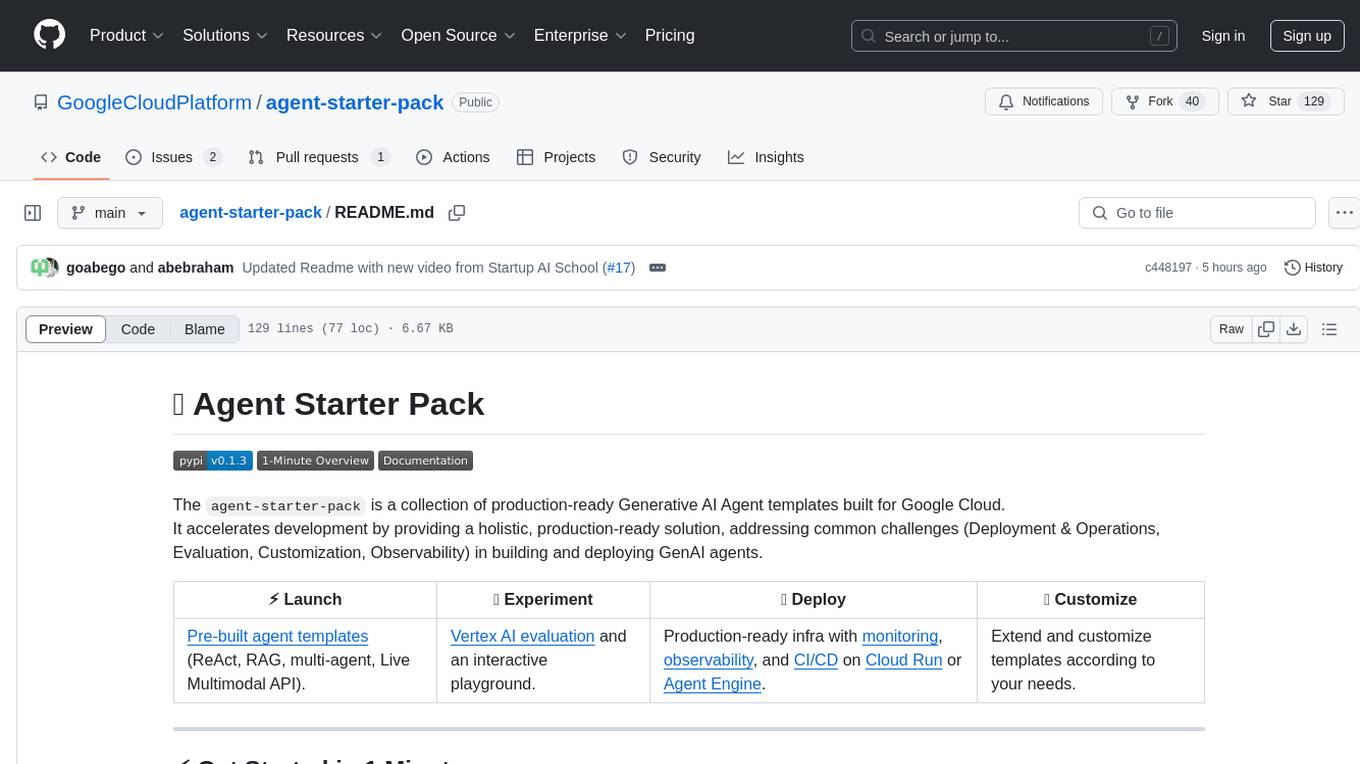
agent-starter-pack
The agent-starter-pack is a collection of production-ready Generative AI Agent templates built for Google Cloud. It accelerates development by providing a holistic, production-ready solution, addressing common challenges in building and deploying GenAI agents. The tool offers pre-built agent templates, evaluation tools, production-ready infrastructure, and customization options. It also provides CI/CD automation and data pipeline integration for RAG agents. The starter pack covers all aspects of agent development, from prototyping and evaluation to deployment and monitoring. It is designed to simplify project creation, template selection, and deployment for agent development on Google Cloud.
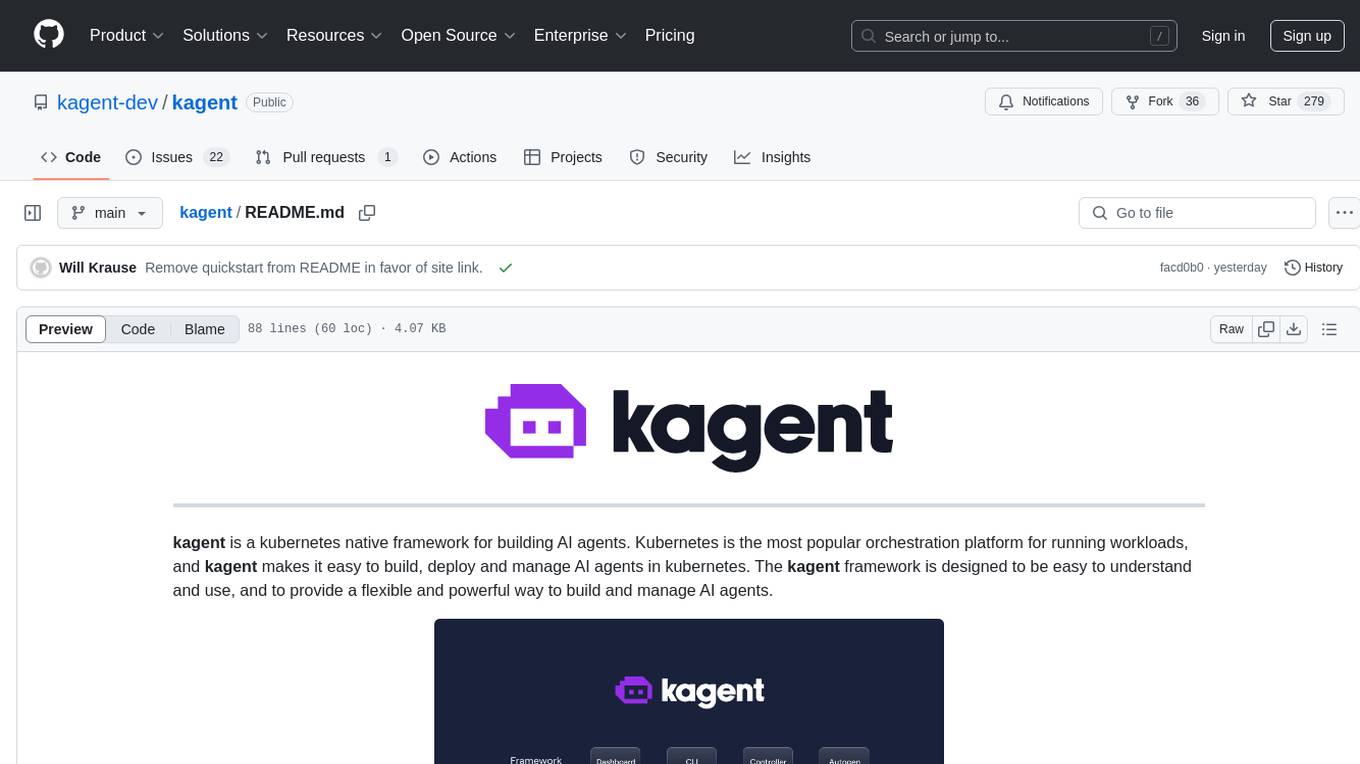
kagent
Kagent is a Kubernetes native framework for building AI agents, designed to be easy to understand and use. It provides a flexible and powerful way to build, deploy, and manage AI agents in Kubernetes. The framework consists of agents, tools, and model configurations defined as Kubernetes custom resources, making them easy to manage and modify. Kagent is extensible, flexible, observable, declarative, testable, and has core components like a controller, UI, engine, and CLI.

motia
Motia is an AI agent framework designed for software engineers to create, test, and deploy production-ready AI agents quickly. It provides a code-first approach, allowing developers to write agent logic in familiar languages and visualize execution in real-time. With Motia, developers can focus on business logic rather than infrastructure, offering zero infrastructure headaches, multi-language support, composable steps, built-in observability, instant APIs, and full control over AI logic. Ideal for building sophisticated agents and intelligent automations, Motia's event-driven architecture and modular steps enable the creation of GenAI-powered workflows, decision-making systems, and data processing pipelines.
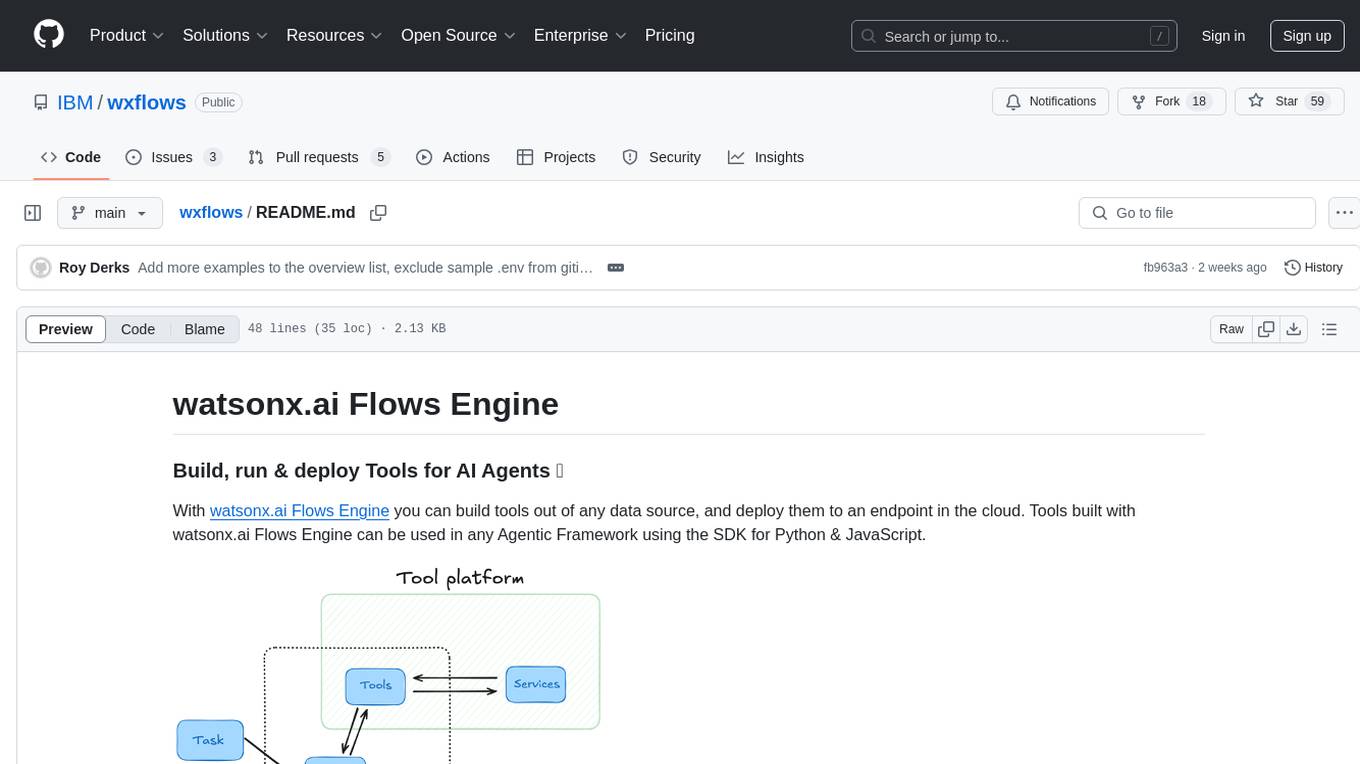
wxflows
watsonx.ai Flows Engine is a powerful tool for building, running, and deploying AI agents. It allows users to create tools from various data sources and deploy them to the cloud. The tools built with watsonx.ai Flows Engine can be integrated into any Agentic Framework using the SDK for Python & JavaScript. The platform offers a range of tools and integrations, including exchange, wikipedia, google_books, math, and weather. Users can also build their own tools and leverage integrations like LangGraph, LangChain, watsonx.ai, and OpenAI. Examples of applications built with watsonx.ai Flows Engine include an end-to-end Agent Chat App, Text-to-SQL Agent, YouTube transcription agent, Math agent, and more. The platform provides comprehensive support through Discord for any questions or feedback.
For similar jobs

sweep
Sweep is an AI junior developer that turns bugs and feature requests into code changes. It automatically handles developer experience improvements like adding type hints and improving test coverage.

teams-ai
The Teams AI Library is a software development kit (SDK) that helps developers create bots that can interact with Teams and Microsoft 365 applications. It is built on top of the Bot Framework SDK and simplifies the process of developing bots that interact with Teams' artificial intelligence capabilities. The SDK is available for JavaScript/TypeScript, .NET, and Python.

ai-guide
This guide is dedicated to Large Language Models (LLMs) that you can run on your home computer. It assumes your PC is a lower-end, non-gaming setup.

classifai
Supercharge WordPress Content Workflows and Engagement with Artificial Intelligence. Tap into leading cloud-based services like OpenAI, Microsoft Azure AI, Google Gemini and IBM Watson to augment your WordPress-powered websites. Publish content faster while improving SEO performance and increasing audience engagement. ClassifAI integrates Artificial Intelligence and Machine Learning technologies to lighten your workload and eliminate tedious tasks, giving you more time to create original content that matters.

chatbot-ui
Chatbot UI is an open-source AI chat app that allows users to create and deploy their own AI chatbots. It is easy to use and can be customized to fit any need. Chatbot UI is perfect for businesses, developers, and anyone who wants to create a chatbot.

BricksLLM
BricksLLM is a cloud native AI gateway written in Go. Currently, it provides native support for OpenAI, Anthropic, Azure OpenAI and vLLM. BricksLLM aims to provide enterprise level infrastructure that can power any LLM production use cases. Here are some use cases for BricksLLM: * Set LLM usage limits for users on different pricing tiers * Track LLM usage on a per user and per organization basis * Block or redact requests containing PIIs * Improve LLM reliability with failovers, retries and caching * Distribute API keys with rate limits and cost limits for internal development/production use cases * Distribute API keys with rate limits and cost limits for students

uAgents
uAgents is a Python library developed by Fetch.ai that allows for the creation of autonomous AI agents. These agents can perform various tasks on a schedule or take action on various events. uAgents are easy to create and manage, and they are connected to a fast-growing network of other uAgents. They are also secure, with cryptographically secured messages and wallets.

griptape
Griptape is a modular Python framework for building AI-powered applications that securely connect to your enterprise data and APIs. It offers developers the ability to maintain control and flexibility at every step. Griptape's core components include Structures (Agents, Pipelines, and Workflows), Tasks, Tools, Memory (Conversation Memory, Task Memory, and Meta Memory), Drivers (Prompt and Embedding Drivers, Vector Store Drivers, Image Generation Drivers, Image Query Drivers, SQL Drivers, Web Scraper Drivers, and Conversation Memory Drivers), Engines (Query Engines, Extraction Engines, Summary Engines, Image Generation Engines, and Image Query Engines), and additional components (Rulesets, Loaders, Artifacts, Chunkers, and Tokenizers). Griptape enables developers to create AI-powered applications with ease and efficiency.













